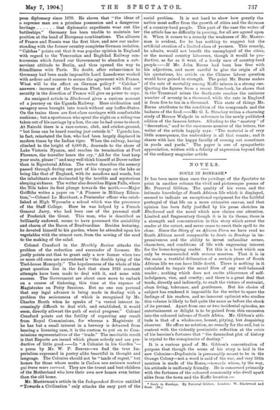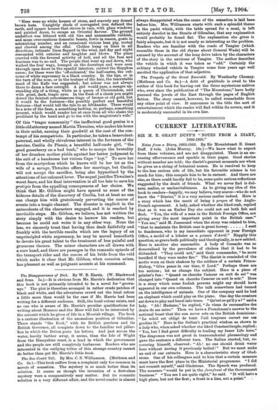IT has been more than once the privilege of the
Spedator to print in another column the vivid and picturesque poems of Mr. Perceval Gibbon. The quality of his verse, and the intimate knowledge of South African life which it displayed, seemed to indicate an exceptional equipment for the faithful portrayal of that life on a more extensive canvas, and that opinion has been fully justified by his prose sketches in Blackwood and the novel which now claims our attention. Limited and fragmentary though it is in its theme, there is a strength and concentration in this story which arrest the reader at the outset, and never cease to exert their spell to its close. Since the Story of an African Farm we have read no South African novel comparable to Souls in Bondage in im- pressiveness and the ability to invest unfamiliar scenes, characters, and conditions of life with engrossing interest for the home-keeping reader. Yet this is a book which can only be recommended with serious reserves. That it is in the main a truthful delineation of a certain phase of South African life we can have little doubt. There is nothing in it calculated to impair the moral fibre of any well-balanced reader ; nothing which does not excite abhorrence of self- indulgence, vice, and cruelty; and there is a great deal that tends, directly and indirectly, to exalt the virtues of restraint, clean living, tolerance, and gentleness. But his choice of subject has rendered it impossible for the writer to spare the feelings of his readers, and no innocent optimist who studies this volume is likely to feel quite the same as before the shock of its perusal. Apart from one or two incidental episodes, no entertainment or delight is to be gained from this excursion into the coloured inferno of South Africa. Mr. Gibbon's atti- tude is that of a wholesome, honest, pitying, but despairing observer. He offers no solution, no remedy for the evil, but is content with the violently pessimistic reflection at the crisis of his heroine's fortunes that " the damnedest plot of history is crystal to the conspiracies of destiny."
It is a curious proof of Mr. Gibbon's concentration of purpose that though the scene of his story is laid in the new Colonies—Dopfontein is presumably meant to be in the Orange Colony—not a word is said of the war, and very little mention is made of the Boers,—towards whom, by the way, his attitude is uniformly friendly. He is concerned primarily with the fortunes of the coloured community who dwell apart alike from the town and the Kaffir location :—
* Souls in Bondage. By Perceval Gibbon. London: W. Blackwood and Sons. On.] "Here were no white houses of stone, and scarcely any domed brown huts. Unsightly sheds of corrugated iron defaced the earth, and square houses that strove in vain, with glass windows and painted doors, to escape an Oriental flavour. The ground underfoot was littered with old tins and unnameable rubbish, and mean over-cautious domestic beasts, fowls in reason, goats in astonishing number, and an occasional vicious lean pig, rooted and chewed among the offal. Clothes hung on lines in all directions, intimate linen flapped in the wind, and day and night resounded with outcries and laughter and blows. The place crawled with the fevered activity of hell, and all the fuss and business was to no end. The people that went up and down, who walked the foul ways, lounged on the doorsteps and were seen through open doors in the squalid interiors, carried the Sisyphus curse; for these were the 'off-coloured,' the half-castes, the out- come of white supremacy in a black country. In the lips, or in the turn of the nose, or in the texture of the hair, the inscrutable mask of the Kafir was suggested; but colour was not always there to damn a face outright. A girl would pass, a meagre up- standing slip of a thing, white as a queen of Christendom, and with great, dark, tragic eyes. In the flush of a cheek you might detect the faintest subcutaneous tinge of bronze or old gold, but it would be the features—the possibly perfect and beautiful features—that would tell the tale to an Afrikander. There would be a note of the faun, a something lacking, or, perhaps, something present, which would sunder her at once from all who shake the predikant by the hand and go to tea with the magistrate's wife."
Of this "tragic community" the ineffectual good genius is a little old attorney named Martin Thwaites, who makes his home in their midst, earning their goodwill at the cost of the con- tempt of his compatriots. In particular, he takes a benevolent, paternal, and wholly chivalrous interest in the fortunes of the heroine, Cecilia du Plessis, a beautiful half-caste girl, " the good gooseberry on a bad bush," who to escape the brutality of her drunken mother yields against her better judgment to the suit of a handsome but vicious Cape " boy." To save her from the martyrdom which he knows will be her lot as the wife of a savage, Thwaites offers her marriage, but Cecilia will not accept the sacrifice, being also hypnotised by the attentions of her coloured lover. The sequel justifies Thwaites's worst fears, and his final intervention is all too late to save his protegee from the appalling consequences of her choice. We think that Mr. Gibbon might have spared us some of the hideous details of the discovery of Cecilia, but at least no one can charge him with gratuitously perverting the course of events into a tragic channel. The disaster is implicit in the antecedents of the characters engaged, and it is reached by inevitable steps. Mr. Gibbon, we believe, has not written the story simply with the desire to harrow his readers, but because he could not write it in any other way. None the less, we sincerely trust that having thus dealt faithfully and frankly with the terrible results which are the legacy of an unprincipled white supremacy, he may be moved henceforth to devote his great talent to the treatment of less painful and gruesome themes. The minor characters are all drawn with a sure hand, and there are passages in the romantic episode of the transport rider and the rescue of his bride from the veld
which make it clear that Mr. Gibbon, when occasion arises, has pleasant as well as poignant accents at his command.











































 Previous page
Previous page